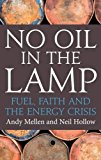 This is an eye-opening book. Like many people of my generation (born this side of 1970 – just!) I do my best to recycle, turn out lights, buy Fairtrade and take public transport (whenever I have the time to do so, or when it’s not too cold, or when I don’t have big shopping bags to carry …). I’m even planning on making sure the next house I move to has a south-facing roof so I can install solar panels. But my efforts have been ad hoc at best. Until I read No Oil in the Lamp I had no understanding of the complexities behind the energy crisis and how it will impact every facet of life in the near future. I’ve heard scientists and politicians arguing about it but have never felt informed enough to really grasp what they were talking about. Andy Mellen and Neil Hollow have changed that. They sketch out in simple, unpatronising terms, the various arguments for and against each energy source. The concept of the long-term sustainability of each commodity consumed or energy source generated in terms of the ratio between energy-in and energy-out gave me a completely new perspective on my consumption. Scrupulously sourced and with more follow-up references than tunnels in a rabbit warren, this book could keep you busy for a very long time. But when you’re finished, don’t forget to pass it on: it’s essential reading! Oh, and they have an excellent website too www.theoillamp.co.uk
This is an eye-opening book. Like many people of my generation (born this side of 1970 – just!) I do my best to recycle, turn out lights, buy Fairtrade and take public transport (whenever I have the time to do so, or when it’s not too cold, or when I don’t have big shopping bags to carry …). I’m even planning on making sure the next house I move to has a south-facing roof so I can install solar panels. But my efforts have been ad hoc at best. Until I read No Oil in the Lamp I had no understanding of the complexities behind the energy crisis and how it will impact every facet of life in the near future. I’ve heard scientists and politicians arguing about it but have never felt informed enough to really grasp what they were talking about. Andy Mellen and Neil Hollow have changed that. They sketch out in simple, unpatronising terms, the various arguments for and against each energy source. The concept of the long-term sustainability of each commodity consumed or energy source generated in terms of the ratio between energy-in and energy-out gave me a completely new perspective on my consumption. Scrupulously sourced and with more follow-up references than tunnels in a rabbit warren, this book could keep you busy for a very long time. But when you’re finished, don’t forget to pass it on: it’s essential reading! Oh, and they have an excellent website too www.theoillamp.co.uk
I have also interviewed the editor of this book about the impact that the energy crisis and the decline of renewable energy sources might have on the publishing industry. You can read all about it over at The Crafty Writer.

Using the wind to produce ecetcrility in large quantities is a fairly new concept. Using the wind for power has been around as long as boats first used a sail to move it through the water.Going Green is right that it will not become dominant because it is unpredictable. The problem with some of the others becoming major sources of power is the same. I live in the northern latitudes, where we get a lot of cloudy weather. We could not depend on solar as our main source of energy. There are a lot of days the wind is not blowing at all, especially in the summer. There are some places trying geothermal, but they have to go down so far to find the necessary heat, that the cost is too high to be practical.There are no quick and easy solutions to the problem of alternatives to fossil fuels, and there won’t be any time soon.
Hi Ajit, I also live fairly far north and we could not depend on solar as our main source. The key is not to depend on one source but to use a matrix of energy sources. This requires storage capacity. When the sun is shining energy is stored up and released when it isn’t – same with wind. There is the technology available but it’s the cost that’s prohibitive. But if governments don’t make the difficult decisions to invest in renewable energy now while we can still depend on at leas some fossil fuel, it will be even more difficult to do so in the future. Thanks for stopping by¬